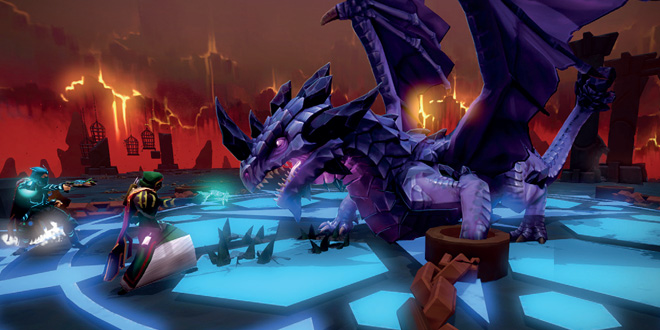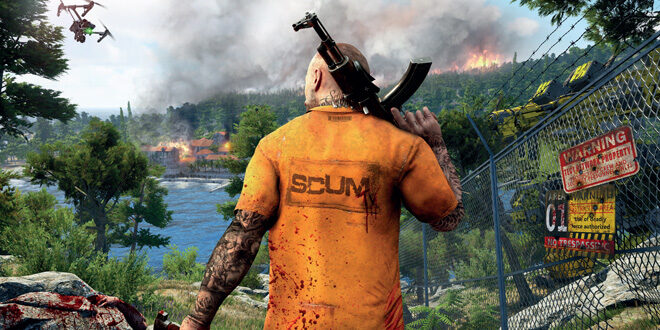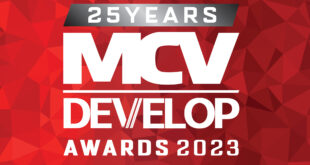 With RuneScape going from strength to strength and an Unreal Engine 5 game in development, Jagex is celebrating a year that has delivered two studio acquisitions and new publishing deals. For CEO Phil Mansell, however, the challenge is to remain disciplined and focused on supporting and delivering for its teams, partners and communities.
With RuneScape going from strength to strength and an Unreal Engine 5 game in development, Jagex is celebrating a year that has delivered two studio acquisitions and new publishing deals. For CEO Phil Mansell, however, the challenge is to remain disciplined and focused on supporting and delivering for its teams, partners and communities.
Let’s start with third-party publishing, which has been all the rage recently. Jagex was doing it, your neighbour set up Frontier Foundry, Sumo has established Secret Mode as an indie publisher. How have you fared?
I’d say that we’re in a somewhat different position than others. You’ve got quite a lot of dedicated indie or mid-market publishers that are out there and a lot of them do really well. There’s so much good content out there. It’s not an easy business. If it were easy, even more people would be doing it. You’ve got to understand the customer. You’ve got to understand how to do right by your developers. You have to understand how to take a game to market at a high quality. I think for us, we look at it a little bit differently compared to some of the others, in that we don’t have to ship five to ten games a year to keep our business running. We can be selective. We can choose the games that really make sense for our skill set, for our areas of interest.
Generally, it’s the community-driven vibe that we have, that’s our connecting thread that we want to see; not just the game but how the developer works and if they’re really into that. So yeah, I think we’re in probably a somewhat more advantageous position. We haven’t got an arbitrary number of games we have to publish. We’re very fortunate that we’ve got a very successful scale business already with our RuneScape games and the other games that we’re building, as well as our acquisitions. So we can be patient. We can find the right partners and the right games and make sure we can offer them a great service and help them build a community. You’ve got to be selective and we’re in a position where we’re very fortunate that we can do that; really make sure that when we sign up with people, we can do right by them and their players.
It’s been said that you’re focusing on games that align with RuneScape and the kinds of games that Jagex is known for, so what is the alignment in the deal with Snowcastle Games and the acquisition of Oregon’s Pipeworks and, more recently, SCUM developer Gamepires?
We want to be the best in community-driven games. We’ve got our RuneScape series that does obviously very well – it has a great community that continues growing. We have lots of plans with our current RuneScape games and will do more – but we wanted to branch beyond that as well and use the skills and interests that we’ve got in this community space. Definitely not locked into MMORPGs, as our RuneScape games mean that we’ve got that well covered. So it’s looking for opportunities where we can team up with people, have partnerships, or even make acquisitions, where the game ties in with those interests and strengths that we have. With SCUM from Gamepires it’s a big, multiplayer, very community-orientated, open world sandbox game, with simulation and shooter aspects in there as well.

The team at Gamepires, they are super community orientated and community driven. They listen, they care. They take the community’s ideas, suggestions and feedback and feed it right back into the games. I saw recently that they even polled their players about what they want the development priorities to be, what they should focus on next, asking what needs the highest priority in fixing or adding to the game. So, not just listening to the players, but being directly guided by them as well. For me, that’s the connection with RuneScape and our wider ambitions around building a very community-driven company . It’s not just a product, it’s how you make it and how you work with the community. That’s where they felt so close to us. As we started talking to those guys, we could see that, not only was it an awesome game with a lot of potential and a lot of proven success already, but the way they worked with their players was just totally up our street and matched our way of thinking.
That’s what made it what I’d call a ‘sweet-spot partnership’ for us. A game that’s great, huge potential, at scale, where we know we can add a lot of value on the publishing side, but the team themselves are clearly not just super super skilled, they’re already very community-orientated – so that match was ideal. Pipeworks is more about building the Jagex infrastructure out. Pipeworks was about talent. Pipeworks have 200 extremely talented devs in AAA games-as-a-service. They’re in North America, the West Coast, over in Oregon. They have a strong business and amazing track record, but their skill set exactly matches us. There’s not that much of that around and it was a way for us to get a great team. It was a way to get a geographic presence and build our talent base in North America. Because really, we’ve just been centred around the UK and Europe so far. Pipeworks do have their own IP, but the majority of their efforts go into working with partners like EA, Microsoft, Activision, Wizards of the Coast.
What is the main thrust of your strategy? Last year when Unreal Engine 5 came out, you were pretty quick in saying you’re doing something internally with that. Obviously, you’ve got RuneScape which is a massive thing and now with SCUM as well, so it seems like you are pushing forward on all fronts. Is that the case?
The long term ambition is to be the world’s most community-driven games company. From that, we work out what are the best things to focus on. Now clearly the core of our long-term business has been our RuneScape MMORPGs. We’re going to continue to grow those games and those communities that support both technological and design innovations we’re working on for the future, especially ones that play into that sort of community driven idea. That’s at the heart of the company. So we’re always gonna be super serious about RuneScape. We do want to do more with the RuneScape universe. We’ve been working on it for over 20 years.
There’s huge amounts of creative energy in there that we want to do more with. So, as you say, we have a new game we’re building internally – a couple of new games actually – within the RuneScape universe, not necessarily MMORPGs in the same way that the existing games are, but looking at adjacent opportunities where our interests and skills also make sense with the RuneScape brand and what it means to people. Obviously we want to grow and expand and use RuneScape as a way of doing that. But it also occurs to us, if we really care about building better communities, we’ve got skills where we can help other people do that. Obviously we’ve been building communities with our RuneScape games and working really closely with players for a long time.
So how can we leverage our skills to help grow the company and achieve this ambition? That’s in a few ways. One is investing in our underlying technology. So our platform to be able to provide services and features – and the analytics, the ecommerce, the community features – that sit under all of our games, modernising that so it can not just be great for our RuneScape and old school games, but for all our other games and our partners’ games.
It’s also saying, ‘Okay, if this is something we are really passionate about, we think we’re quite good at and we can help other people, how can we express that and find opportunities?’ Third-party publishing is one aspect of that, are there partners for whom they are very community orientated but what they don’t feel they need to do is build their own publishing organisation.
That’s where we can take their technical and creative skills and our publishing and community methodologies and combine those together and get the best of both. The same, in a way, applies with acquisitions. Now, the acquisitions, certainly in the case of Gamepires or SCUM, bringing them into the wider Jagex family and giving them support in a sort of company sense, but there’s also them being able to benefit from Jagex Partners’ go-to-market publishing skills and help them build that community and take that to the next level, taking that to a full launch and taking it further around the globe. Taking that on to consoles as well, is a really big manoeuvre. We’re supporting Gamepires not just on the publishing side, but also helping them with more intense, wider development efforts. Ideally SCUM becomes for us another evergreen game where millions of people play every month and they do so for decades to come. That’s our ambition.

What’s planned for this year? Are we going to see more acquisitions, a new game reveal at some point? What’s on the cards?
I want to be clear. We’re not going to be buying up every company that we see or doing very high volumes of publishing deals. We aren’t trying to be a publishing-first company. For us, third party publishing and mergers and acquisitions are tools in our toolbox to build the Jagex family of studios and portfolio of games. But it’s definitely about being selective. We’re not like a Katamari ball rolling around the industry, absorbing everyone in our path. We’re much more careful and selective. It’s brilliant that we’ve got the backing and scale and confidence to be able to make serious acquisitions and investments and also do great publishing deals, but we don’t need to hit a schedule or acquire a company a quarter in order to please the market. So there aren’t any imminent acquisitions to talk about, but we continue to talk with people around the industry and see what opportunities are out there.
How difficult is it being a publisher that’s synonymous with a game with a massive orbit like
RuneScape, where you don’t want to be in a position where you’re gonna burn up in the atmosphere if it
starts to decline, but you don’t want to shoot off and leave it behind either. It seems like it’s a balance that takes years to find and I’m wondering if you feel like you’ve found it now?
That’s a good question. It’s really important for us that our RuneScape games and our partnerships don’t undermine each other. We’ve set our company up such that we all benefit from the shared technology, the broader community that we’re building, and the institutional skills of the company – but we’re not begging or borrowing from within the company. Our Jagex Partners team is dedicated to our partners. We built that team so that there’s no contention inside our company for attention and skills and resources between our internal teams and our partners. That’s really important to make sure that they know that.
You know, our RuneScape games together make well north of £100 million of revenue a year and have millions and millions of customers. We want that to be seen and to be used as a benefit to partners, not something that overshadows them. So that’s, I think, really important to say and, yeah, it has taken us a while to build the right internal structures in the company so that there’s a benefit from what we’ve got. It’s also why we haven’t signed another MMORPG, right? We’re not trying to compete. We don’t design games that compete with the ones we already have. It’s really important that they are complimentary.
When Jagex was acquired in 2001, did that provide the stability you needed – a platform to launch from?
Massively, yeah, Having an investor base that is professional, long term, supports our growth and the fact we’ve made two relatively sizable acquisitions for the scale of our current company, shows that Carlyle Group totally back us, and not just with the current and news games that we’re making, but also the partnerships and acquisitions that we’re going through, is that we’ve got a really solid partner that totally bought into our vision and are happy for us to make these significant investments to push that forward.
What are the challenges that you see ahead for the industry but also for Jagex in particular?
What we want to do is never take the RuneScape games for granted. They are the pillars on which we built the current company. Although Jagex now is bigger, more diversified – we’ve got more staff in different countries that are building a wider portfolio. We’re never going to take our games for granted. We’re going to continue to keep investing in growing those. We also don’t want to overreach. The partnerships that we make need to be disciplined, as in, not going for volume of games, not running before we can walk
We don’t over stretch ourselves. We stay focused on things we know where we can add value, and we’re not not moving into high-end AAA console, single player games. We’re not doing a hard pivot into VR or AR or blockchain. We’re really staying within the area that we know.
Obviously we’ve got to ask about RuneScape. How’s it doing?
Absolutely brilliant. Our RuneScape games have more players and more revenue than ever, and the other thing I’m really pleased over the last year is that we’ve been able to build, not just a great roadmap for each of our two main RuneScape games at the moment, but also, we’re doing underlying investment in our technologies. I don’t want to preempt stuff that we’re doing research and development on at the moment, but we’re doing some really exciting things over the next few years. Making them even more community driven is probably as much as I’ll say, that I think will make people – not just gamers but the industry – really look at what we’re doing and say ‘Wow.’ Like, the RuneScape games have been around for so long, and they’ve done so well, but they can sort of be in people’s minds as what happened in the past, whereas there’s a real innovation, both in gameplay and technology that we’re looking at that I think will show that there’s a lot of ideas and freshness and relevance for the future.

 MCV/DEVELOP News, events, research and jobs from the games industry
MCV/DEVELOP News, events, research and jobs from the games industry




